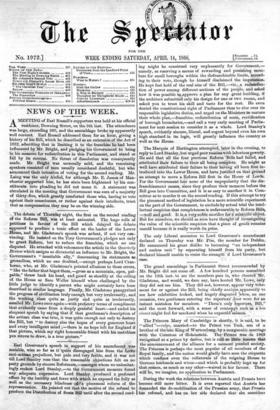The debate of Thursday night, the first on the second
reading of the Reform Bill, was at least animated. The huge rolls of petitions in favour of the Bill which delayed the debate appeared to produce a tonic effect on the leader of the Lower House, and Mr. Gladstone's speech was ardent, if not very con- vincing. He insisted on the Tory Government's pledges not only to grant Reform, but to reduce the franchise, which no one disputed. He attacked with vehemence the article in the Quarterly Review which assigns so dictatorial an influence to Mr. Bright, the Government's "insatiable ally," denouncing its statements as groundless, which no one doubted,—except perhaps Lord Cran- borne, who, at Mr. Gladstone's pointed allusions to these errors, "like the father that begot them, —gross as a mountain, open, pal- pable," threw back his head, and gazed as steadily at the ceiling of the House as Sam Weller himself when challenged by the little judge to identify a parent who might certainly have been described in similar language. Finally, Mr. Gladstone panegyrized the progress of civilization truly enougli but very irrelevantly, and the working class quite as justly and quite as irrelevantly, asaailed Mr. Lowe once again—with prefatory terms of compliment that evidently came from a deeply grateful heart—and ended his eloquent speech by saying that if that gentleman's description of the artizan class was true, it was quite enough not only to destroy the Bill, but "to destroy also the hopes of every generous heart and every intelligent mind ;—there is no hope left for England if that picture, which my right honourable friend with his matchless pen strove to draw, is a true picture."






























